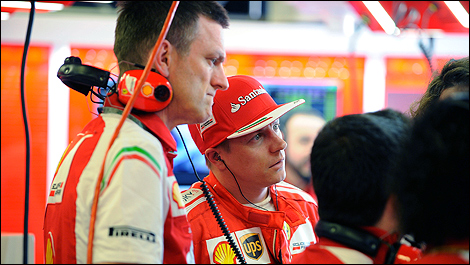Mar
18th
Stay connected Subscribe to our RSS feed
From Ferrari
The scenario suggested by winter testing turned out to be true in Australia, at the first Formula 1 Grand Prix of the year.
There was little doubt that all the teams would be facing reliability issues, or that these will continue to be a decisive factor throughout the course of the season.
As would car performance, which, from what was seen in Albert Park, means that all the teams will be working either to close the gap, as is the case for Scuderia Ferrari, or to maintain it in the case of Mercedes.
Reliability was certainly again encouraging for Ferrari, even if there is still room for improvement to ensure that the new and complex power unit works at its best.
However, the main task facing the team at the moment is increasing the efficiency of the F14 T, as the Scuderia's technical director, James Allison explained to www.ferrari.com.
“While we can take some satisfaction from the reliability shown by the F14T, it is clear that we have our work cut out to improve our car in order to compete on equal terms with the Mercedes team,” said Allison.
“There is plenty about the F14T that is working very well: The starts and the pace in the corners - especially the high speed ones - are particular strong points, but we need to work further on the stability under braking and the speed on the straights.”
While it might be stating the obvious, in Maranello, the work goes on round the clock to achieve the improvements Allison mentions as soon as possible.
“All the recent seasons in F1 have been characterised by a fierce development battle from March until November. With all the new regulations this year, the opportunities to improve the car are legion and we can expect the race to improve the cars to be even more intense than normal,” Allison added.
Therefore, after the Australian Grand Prix, the lesson has been learned and there is a great desire to get the homework done.
“Our competitiveness was not acceptable in Melbourne. But we intend to fight our way back up the grid with the improvements that we will bring to the car,” the British engineer said.
The scenario suggested by winter testing turned out to be true in Australia, at the first Formula 1 Grand Prix of the year.
There was little doubt that all the teams would be facing reliability issues, or that these will continue to be a decisive factor throughout the course of the season.
As would car performance, which, from what was seen in Albert Park, means that all the teams will be working either to close the gap, as is the case for Scuderia Ferrari, or to maintain it in the case of Mercedes.
Reliability was certainly again encouraging for Ferrari, even if there is still room for improvement to ensure that the new and complex power unit works at its best.
However, the main task facing the team at the moment is increasing the efficiency of the F14 T, as the Scuderia's technical director, James Allison explained to www.ferrari.com.
 |
| James Allison and Kimi Raikkonen. (Photo: Ferrari) |
“While we can take some satisfaction from the reliability shown by the F14T, it is clear that we have our work cut out to improve our car in order to compete on equal terms with the Mercedes team,” said Allison.
“There is plenty about the F14T that is working very well: The starts and the pace in the corners - especially the high speed ones - are particular strong points, but we need to work further on the stability under braking and the speed on the straights.”
While it might be stating the obvious, in Maranello, the work goes on round the clock to achieve the improvements Allison mentions as soon as possible.
“All the recent seasons in F1 have been characterised by a fierce development battle from March until November. With all the new regulations this year, the opportunities to improve the car are legion and we can expect the race to improve the cars to be even more intense than normal,” Allison added.
Therefore, after the Australian Grand Prix, the lesson has been learned and there is a great desire to get the homework done.
“Our competitiveness was not acceptable in Melbourne. But we intend to fight our way back up the grid with the improvements that we will bring to the car,” the British engineer said.
 The latest auto news, reviews, prices, product and vehicle releases.
The latest auto news, reviews, prices, product and vehicle releases.